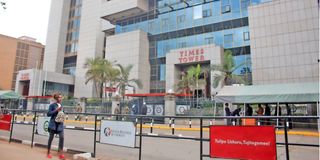KRA blocks more than 30 trucks from exporting salt to Tanzania

The Kenya Revenue Authority's head office at Times Towers in Nairobi. The authority’s revenues have increased since reopening of the country began.
Tension is rising at the one-stop border post in Lunglunga, Kwale County after more than 30 trucks carrying salt exports from Kenya were blocked from leaving the country.
The trucks loaded with tonnes of salt have been lying at the border for two weeks over what the drivers said was their failure to produce a permit from the Mining ministry.
The drivers, who are now counting losses, say Kenya Revenue Authority officials are demanding the permit despite them making all other payments and producing documents required to cross the border with the goods.
Ali Hassan, one of the truck drivers, claims this is the first time they are having challenges transporting salt to neighbouring Tanzania.
“We have never had issues transporting the salt and we do not know what has changed. They should have let us pass and sort the issues later with the salt mines,” he lamented.
Mr Hassan said he was transporting salt from Malindi while the rest are mostly from Changamwe in Mombasa County.
The salt brands being exported, they said, were Kaysalt, Kensalt and Sea Salt, which they could not communicate directly to companies as they are dealing with agents.
Abdalla Kileo, another transporter, said they were already facing losses after spending more than ten days at the border.
“We have spoken to our agents but they have told us to wait here. These vehicles are needed on the other side to also transport other goods. The issue should be sorted as soon as possible,” he said.
They say they have been sleeping in their trucks after crossing to Tanzania to find food, eat and then return to Kenya at around 8 pm.
“There is a curfew in Kenya, so we have to get back to the trucks and sleep early. I am spending a lot of money while here and soon I will run out of it,” a transporter said.
This is not the first time trucks have been stuck at the border point. In March, more than 30 trucks loaded with maize were blocked from entering Kenya due to claims that the maize contained aflatoxin.
The Agriculture and Food Authority had enforced stringent measures that had to be followed for anyone importing maize into the country, despite President Uhuru Kenyatta asking Agriculture Cabinet Secretary Peter Munya to ensure speedy clearance of maize stocks at border points.
Among the rules is that any consignment has to meet the maximum permissible aflatoxin levels of 10 parts per billion, a basis upon which maize from Tanzania and Uganda were barred from entering Kenya.
The guidelines also comprised other requirements such as registration of all importers through the AFA’s system and presentation of a copy of the certificate of registration to the inspector at the border point.





